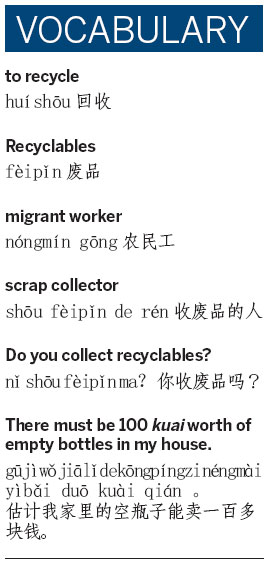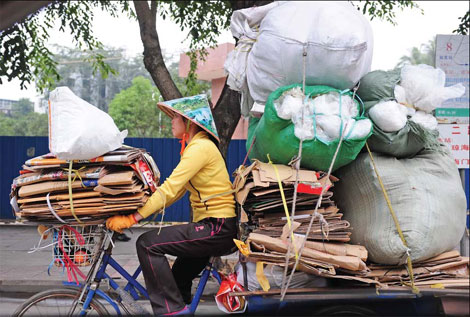Street scraps of gold
Updated: 2012-04-06 07:54
By Nicholas Richards (China Daily)
|
||||||||
|
|
Trash collectors pursue own dreams by riding on city's development
Squeezed between Tsinghua University and the Forestry University in Beijing's Haidian district is a bustling two-lane road, 后八家 (houbajia). It literally means "eight families in the back", and walking down the street you can see how it got its name - it is crowded. The area is lined with restaurants, stalls, and family-run shops. It is dirty, dusty and in the summer heat, it smells. The sidewalks are piled with junk.
In the evening, as rush hour brings the rest of the city to a complete stand-still, this one block comes alive with scrap collectors arriving on their flatbed tricycles. The collectors pedal down the packed street, teetering dangerously under towers of collapsed cardboard boxes, bags of bottles, stacks of mattresses, and piles of old computer monitors, printers, lamps, books and clothes.
These men and women have scoured the city on bike, collecting any and all recyclables they can get their hands on, before heading to Houbajia. As you see them biking through the city, laden with scraps, this is likely where they are headed.
As the sun sets, they pedal their loads down the block, chatting with the junk sorters - men who appraise their collections and make them an offer in cash. The scraps are then sold to larger dealers or taken to recycling collection points where they will be sorted again. Finally they will be shipped to recycling plants outside Beijing, some as far away as Hubei province.
 |
And even though one load passing by may appear to be a small dent in the massive world of recycling, in 2006, these peddlers handled a remarkable 80 percent of Beijing's electronics. They form China's underground recycling network, a low-tech solution, but one that works.
Economic analysts and business entrepreneurs have been saying that Beijing's streets are paved with gold - scrap collectors will tell you the trash cans are lined with it too. In 2008, Beijing produced almost 19,000 tons of garbage a day.
A kilogram of used paper is worth about seven jiao, or 10 American cents, and one plastic bottle sells for about one jiao, or one and a half American pennies. Sifting through garbage cans for bottles, or scouring restaurant tables for half-read morning papers, can provide a modest income for some. And that is only the beginning.
"We don't bother with bottles or paper - there's a special place for that down the road," said Huang, a middle-aged mother of four from Hubei province.
Her junk-peddling bike is loaded down with textiles, plastic sheets and scraps of wood. A pile of foam pieces, worth about four yuan each, are scattered at her feet.
With a family to look after, Huang does not have the time to do much collecting herself, but she acts as a middle-man for collectors and larger recycling stations.
Every day, from 2 pm to 6 pm, she stands in the same spot, buying scraps from other collectors. At the end of her work day, she bikes her purchases the short distance home, and sells her goods to another, larger collector.
From these transactions, she makes about 1,000 yuan a month, far more than could be made in her Hubei hometown village.
Most of her friends and family have also left the village, and moved to larger cities across China, looking for work and a chance at a better life.
"Our village of a few hundred has only a dozen or so people left," Huang said with a sharp laugh.
Her sentiments are echoed by another collector who has been working in Beijing for more than 10 years.
In the city, he makes about 1,000 yuan a month driving a motorbike-trailer around town and collecting trash.
Like any other workman in the city, he has a regular work routine. He sets out every morning at eight, scouring the streets for valuable trash. He takes an hour and a half for lunch, and ends his day around five. He rides about 10 km a day.
Like any workplace, there are challenges. "The competition here can be fierce," he said. But with no technical skills and a limited education, it is an appealing job.
"It's either do this or be a cleaner," Huang added, with a sour expression. "And who wants to be a cleaner?"
Yu Hao is a chatty 30-year-old, also from Hubei. Most days, he stands on a Houbajia corner, buying broken electrical appliances from the peddlers, and storing them in a minivan parked in the middle of the sidewalk.
"If they can be fixed, I sell them to second-hand appliance stores. If not, I sell their materials for scrap."
As he spoke, he began to tear apart a water cooler. "I have no technical skills, but I do have an idea. After Spring Festival, I want to buy a computer and learn how to use the Internet."
With a wife, two kids and an income to earn, Yu has not learned to use a computer yet, but hopes to. "I want to bring my business online, and handle the really huge stuff from big buildings - like central air conditioners."
He glances up from his work to scan the other peddlers' scraps as they pedal past. He motions for one man to stop and buys a water cooler for 15 yuan.
"I make four to five yuan off these," he smiled.
On a good day, Yu might make 1,000 yuan, but usually brings in only a few hundred, and a total of 3,000 to 5,000 yuan a month. Spring and summer are the best seasons. Yu has a keen eye, is sharp, and knows his business. He plans to turn his one-person sidewalk recycling operation into a bigger business. This may sound like a pipe-dream, but on the streets of Beijing, anything is possible.
Courtesy of The World of Chinese, www.theworldofchinese.com

 Relief reaches isolated village
Relief reaches isolated village
 Rainfall poses new threats to quake-hit region
Rainfall poses new threats to quake-hit region
 Funerals begin for Boston bombing victims
Funerals begin for Boston bombing victims
 Quake takeaway from China's Air Force
Quake takeaway from China's Air Force
 Obama celebrates young inventors at science fair
Obama celebrates young inventors at science fair
 Earth Day marked around the world
Earth Day marked around the world
 Volunteer team helping students find sense of normalcy
Volunteer team helping students find sense of normalcy
 Ethnic groups quick to join rescue efforts
Ethnic groups quick to join rescue efforts
Most Viewed
Editor's Picks

|

|

|

|

|

|
Today's Top News
Chinese fleet drives out Japan's boats from Diaoyu
Health new priority for quake zone
Inspired by Guan, more Chinese pick up golf
Russia criticizes US reports on human rights
China, ROK criticize visits to shrine
Sino-US shared interests emphasized
China 'aims to share its dream with world'
Chinese president appoints 5 new ambassadors
US Weekly

|

|







